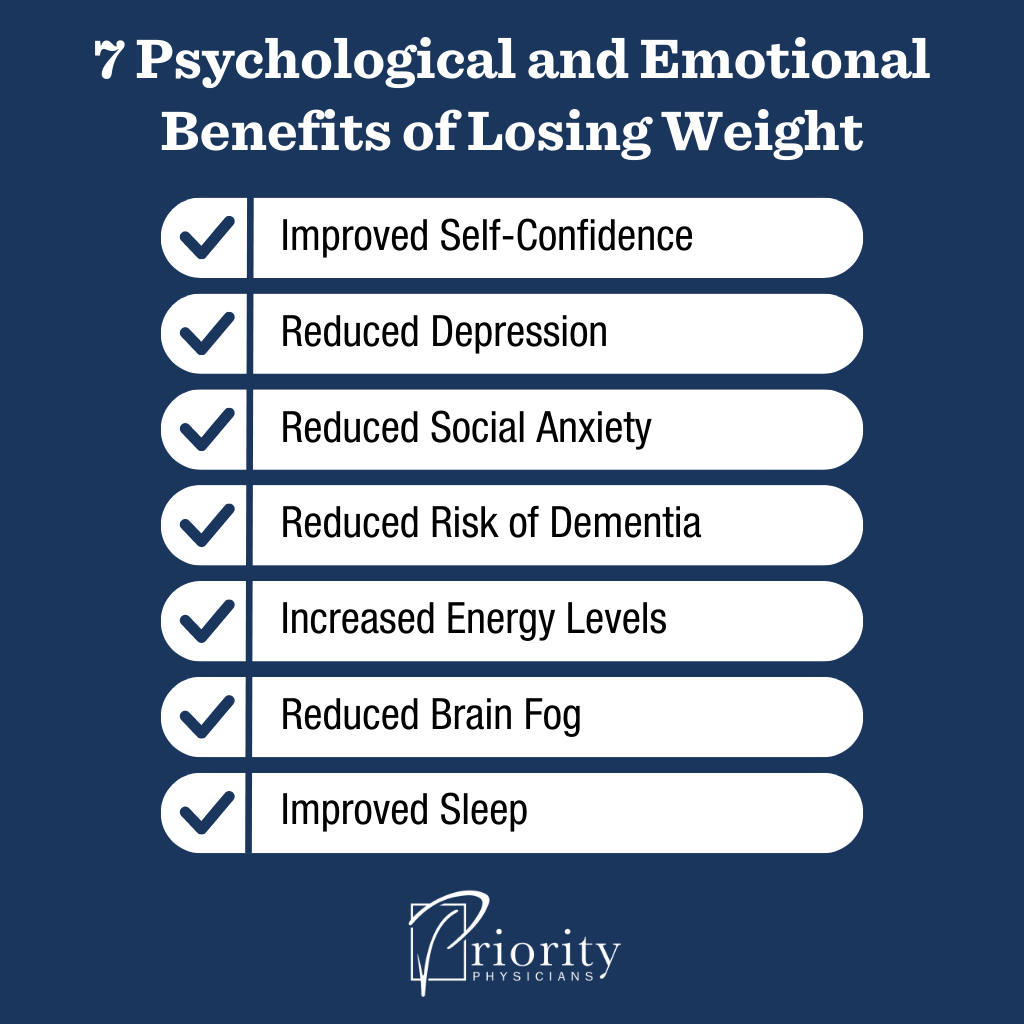As Americans, we love our modern conveniences — DoorDash, FaceTime, remote jobs, etc. — but they do mean we don’t have to move very much. As a result, obesity is on the rise.
Of course, this trend doesn’t apply to everyone. There are plenty of individuals who shouldn’t lose weight. But the majority of Americans could stand to lose a few pounds — and not just for superficial reasons.
The benefits of losing weight go beyond the physical. Losing weight reduces the risk of some of the most common metabolic health threats, including:
- Heart disease
- Hypertension
- Elevated Cholesterol
- Diabetes
While it’s not a guarantee, being overweight is often an antecedent to these conditions, and even a 5–10% loss of body fat can prolong your life expectancy.
That said, there are also some non-physical benefits of losing weight.

7 Psychological and Emotional Benefits of Losing Weight
There are ways to gauge your body’s health beyond its physical appearance, and it’s important to recognize those co-factors. For example, mental health plays a significant role in influencing habits, which impacts your overall health.
Typically, the same lifestyle changes that people make to lose weight also lead to improved mental health. For example, a healthy diet and exercise have been shown to improve conditions like anxiety and depression. (More on this later.)
As a physician, I find that the social and emotional benefits of weight loss often aren’t emphasized as much as the physical benefits. If losing weight is part of the larger strategy you develop with your doctor to optimize your health, here are some benefits you might feel — and not just see.
Improved Self-Confidence
When weight is lost through healthy lifestyle changes, such as eating well and moving regularly, expect to experience a boost in endorphins.
Even if your body isn’t changing visibly just yet, those endorphins can improve your mood and attitude as you work to become your healthiest self.
Reduced Depression
Consistent exercise and an improved diet have been shown to change the balance of neurotransmitters in your brain for the better. You may find your depression symptoms are less severe when incorporating changes to improve your overall health.
Reduced Social Anxiety
Unfortunately, people who are overweight or obese often face negative social stigma from friends, family, and even strangers. As a result, they may suffer from social anxiety. For many, weight loss can help reduce this anxiety.
Reduced Risk of Dementia
Losing even 8% of your body weight can result in a significantly lower risk of developing dementia later in life.
If you think it’s too late for you to experience this benefit of losing weight, think again — even losing weight in your 40s and 50s can reduce your risk of dementia.
Increased Energy Levels
When your body weighs more, it needs to use more energy to move and function throughout the day. Losing weight reduces the demand on your body’s systems, leaving you with more energy to do the things that matter to you.
Reduced Brain Fog
Eating fewer processed foods and decreasing sugar intake is one common lifestyle change that can lead to weight loss. These simple swaps have also been shown to improve cognitive function, helping you think more clearly throughout the day.
Improved Sleep
People who have lower body fat percentages are less likely to snore or suffer from disrupted sleep. Exercising and intermittent fasting can help you fall asleep faster, and losing weight can at times even eliminate conditions like sleep apnea altogether.

Non-Physical Benefits of Losing Weight: Final Thoughts
As a physician, I’m most concerned with lowering my patients’ risk for metabolic conditions that are associated with high mortality rates. But in addition to helping them live as long as possible, I want them to live the best life they can. These supplementary psychological and social benefits to losing weight make healthy choices even more rewarding.

